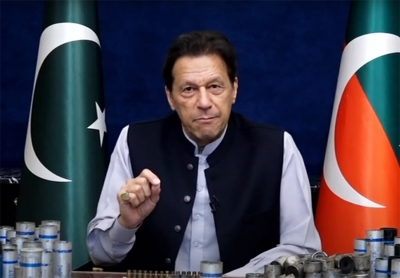BY HAMZA AMEER
Islamabad– The recent series of events which took place after former Pakistan Prime Minister Imran Khan’s arrest on May 9, which included looting and widespread vandalism by Pakistan Tehreek-e-Insaf (PTI) workers, have led some of the top members to part ways from the party.
Reasons for the PTI leaders to jump ship came after Khan’s anti-military establishment narrative with directly blaming incumbent Chief of Army Staff (COAS) General Syed Asim Munir as being the one behind the assassination attempts on his life.
Khan also alleged that the army chief was conspiring against him to weaken his public support and popularity, and to use the government offices to nab him in corruption charges and have him disqualified.
The PTI leadership is crumbling like a house of cards with prominent members succumbing to house raids, multiple arrests, in-custody pressure and being forced to announce their departure from the party and in some cases, from active politics.
While Khan and his party is not the first to have been dismantled of its political muscles in Pakistan’s difficult political history, it has certainly brought back memories of 2018, when he took power through forced allegiances from other political parties, political deals with electable candidates and defecting members of other political parties, who, at the time, were directed by the then sitting military establishment under former Army Chief General (retd.) Qamar Jawed Bajwa to join Khan’s political team and form the government.
However, the forced allegiances or as Khan recently put it as “forced marriages” fast changed route during 2021 and first half of 2022, when the military establishment backed out of its extended support for the PTI chief letting him handle his opposition’s planned motion of Vote of No Confidence (VONC) against him.
Khan’s party support, coalition political parties and many of his party members defected to side with the opposition alliance and ensure his ouster as the country’s Prime Minister.
The current chaos and deterioration spreading like wildfire within PTI, with leadership leaving on a daily basis, seems to give a harsh reality check to Khan, for failing to rely on his political ambitions and working towards strengthening his party with a strong representation of the party politics through his team as well.
Khan’s constant and consistent demand to seek military establishment’s intervention to hold elections in the country and opting to slam them for not coming to his rescue and doing what the former army chief did through the institutional use of force to bring him to power; has most certainly resulted in him having a team of loyalists, personalities and entities in his party, who failed to resist the pressure and decided to party ways with him within a few days.
“Imran Khan’s political agenda during 2018, when he took office as Prime Minister was more targeted towards dismantling, arresting, punishing and breaking his rival political opponents and their parties into pieces through accountability and corruption charges against them. However, despite the fact that top leaders of PML-N and many leaders of PPP were put behind bars in cases against them, their allegiance to their respect political parties stayed intact,” said Musharraf Zaidi, a senior political analyst.
“But as far as PTI is concerned and what it is going through; it is because Imran Khan has failed to look up to anyone but himself to lead the party. He has failed to hold onto people who were with him when he started off 2 decades ago. And like it or hate it, his party members have had enough of following the dictations of Imran Khan, because they have seen themselves being thrown under the bus by Khan himself.”
Many believe that while PTI has been a party of enthusiasm and energy, it has failed to learn the art of politics and team play.
The party hovers around one image of Khan and takes him as the only face of the party at large, ignoring and negating all other members, leaving them high and dry on reputation among the public and the party. (IANS)














